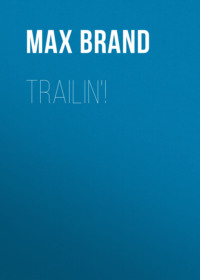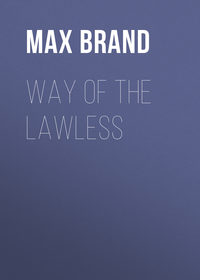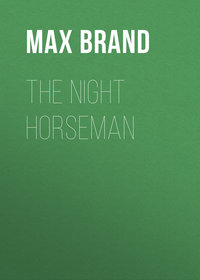 полная версия
полная версияAlcatraz
He went in with the other men to breakfast in the long dining-room of the ranch house, and there was Marianne Jordan again presiding at the head of the table. But half of the glamour of the evening before was gone from her and she kept her eyes seriously lowered, frowning. In fact, she had much to think about, for late the preceding evening Lew Hervey had come to her and showed her the first note that her father had written. She was not alarmed by this sudden trip over the mountains. There had been so many vagaries in the actions of Oliver Jordan in the past few months that this unannounced drive to an undetermined destination was not particularly surprising. It was only the delegation of such authority to Hervey that astonished her.
She forgot even Red Jim Perris and the lost Coles horses in her abstraction, for whenever she looked down the table she saw nothing saving the erect, burly form of the foreman, swelling, so it seemed to her, with a newly acquired and aggressive importance. However, he had the written word of her father, and she had to set her teeth over her irritation and digest it as well as she could.
Hervey had presented reasonable excuses, to be sure. There was certain work of fence-repairing, certain construction of sheds which he had called to the attention of Oliver Jordan and which Jordan had commissioned him to overlook during his absence.
"I told him they wasn't any use in writing out a note like this one," Hervey had assured her, "but you know how the chief is, these days. Sort of set in his ways when he makes up his mind about anything."
And this was so entirely true that she was half-inclined to dismiss the whole matter from her mind. Oliver Jordan paid so little heed to the running of the ranch and when he did make a suggestion he was so peremptory about it, that this commission to Hervey was not altogether astonishing. Nevertheless, it kept her absent-minded throughout breakfast.
Red Perris was naturally somewhat offended by the blankness of her eye as she passed him over. She had been so extremely intimate and cordial the night before that this neglect was almost an insult. Perhaps she had only been playing a game—trying to amuse herself during a dull hour instead of truly wishing to please him. He grew childishly sulky at the thought. After all, there was a good deal of the spoiled child about Red Jim. He had had his way in the world so much that opposition or neglect threw him into a temper.
And he stamped out of the dining-room ahead of the rest of the men, his head down, his brows black. Lew Hervey, following with the other men, had noted everything. It behooved him to be on the watch during the time of trial and triumph and at breakfast he had observed Red Perris looking at the girl a dozen times with an anticipatory smile which changed straightway to glumness when her glance passed him carelessly by. And now Hervey communicated his opinions to the others on the way to the bunkhouse to get their things for the day's riding.
"Our new friend, the gun-fighter," he said, pointedly emphasizing the last phrase, "ain't none too happy this morning. Marianne give him a smile last night and he was waiting for another this morning. He sure looks cut up, eh?"
The bowed head and rounded shoulders of Red Perris brought a chuckle from the cowpunchers. They were not at all kindly disposed towards him. Too much reputation is a bad thing for a man to have on his hands in the West. He is apt to be expected to live up to it every moment of his waking hours. Not a man in the Valley of the Eagles outfit but was waiting to see the newcomer make the first move towards bullying one of them. And such a move they were prepared to resent en masse. That Marianne might have made a good deal of a fool out of Perris, as Hervey suggested, pleased them immensely.
"Maybe the ranch suits him pretty well," suggested Slim, ironically. "Maybe he figures it might be worth his while to pick it up by marrying the old man's girl. Eh, Lew?"
Lew Hervey shrugged his shoulders. He did not wish to directly accuse the gun-fighter of anything, for talk is easily traced to its source and the account of Shorty had filled the foreman with immense respect for the fighting qualities of Red Perris. However, he was equally determined to rouse a hostile sentiment towards him among the cowhands.
"Well," said Lew, "you can't blame a gent for playing for high stakes if he's going to gamble at all. I guess Red Perris is all right. A kid like him can't help being a little proud of himself."
"Damn fat-head," growled Slim, less merciful, "sat right next to me and didn't say two words all through breakfast. Ain't going to waste no words on common cowpunchers, maybe."
So the first impression of Red Jim was created on the ranch, an impression which might be dispelled by the first real test of the man, or which in the absence of such a test might cling to him forever: Perris was a conceited gun-fighter, heart-breaker, and bully. The men who trooped into the bunkhouse behind him already hated him with a religious intensity; in ten minutes, they might have accepted him as a bunkie! For your true Western cowpuncher, when all is said and done, unites with Spartan stoicism a Spartan keenness of suspicion.
It was not hard for the foreman to see the trend of events. Something had roused an ugly mood in Perris. It might be, as he surmised, the girl. No matter what, he was obviously not in a mood to bear tampering with. Hervey determined to force the issue at once, knowing that his other men would be a solid unit behind him.
"Hey there, Red!" he called, cheerily enough, but brusquely, and then, bending over to fuss at a spur, he winked broadly at the other men. They were instantly keen for the baiting of Perris, whatever form it might take.
"Well?" said Red Perris.
"Trot over to the corral and rope that Roman-nosed buckskin with the white stockings on her forelegs, will you? I got a few things to tend to in here."
Now there was nothing entirely unheard of in a foreman ordering one of his men to catch a saddle horse for him. But usually such things were done by request rather than demand, and moreover, there was something so breezy in the manner of Hervey, taking the compliance of Red so for granted, that the latter raised his head slowly and turned to the foreman with a gloomy eye. He had come to the ranch to hunt a wild horse, not to play valet to a foreman.
"Partner," drawled Red Perris, and the silken smoothness of his tones was ample proof that he was enraged. "I don't know the ways you folks have up here, but around the parts where I've been, a gent that's big enough to ride is big enough to saddle his own hoss."
The reply of Lew Hervey was just sharp enough to goad the newcomer—just soft enough to stay on the windward side of an insult.
"I'll tell you," he said quietly. "Around the Valley of the Eagles, the boys do what the foreman asks 'em to do, most generally. And the foreman don't play favorites. I'm waiting for that hoss, Perris."
Perris rolled a cigarette, and smiled as he looked at Hervey. It was a sickly smile, his lips being white and stiff. And in another, it might have been considered a sign of fear. In Red Perris everyone there knew it was simply the badge of a rising fury. They knew, by the same token, that he was as dangerous as he had been advertised. Men whom anger reddens are blinded by it; but those who turn pale never stop thinking. Meantime, Red Jim looked at Hervey and looked at the cowpunchers behind Hervey. It was not hard to see that in a pinch they would be solid behind their foreman. They watched him with a wolfish eagerness. Why they should be so instantly hostile he could not guess but he was enough of a traveller to be prepared for strange customs in strange places. There was only one important point: he would not saddle the buckskin. Moreover, at sight of their solid front and their aggressive sneers he grew fighting hot.
"How gents come in these parts," he said with deliberate scorn, "I dunno. And I don't care a damn. If they brush their foreman's boots and saddle his hosses for him, they can go ahead and do it. But I come up here to catch a wild hoss that the gents in the Valley of the Eagles couldn't get. That's my job, and nothing else."
The growl of his cowpunchers was sweetest music to the ear of Lew Hervey. He glanced at them as much as to say: "You see what I got on my hands?" Then he stepped forward and cleared his throat.
"You're young, kid," he declared. "When you grow up you'll know better'n to talk like this. But cowpunchers we ain't going to make no trouble for you. But I'll tell you short, Perris, you'll go out and rope that hoss or else roll your blankets and clear out. Understand? I was joking when I asked you to rope the hoss first. I wanted to see what sort were. Well, I see, and I don't like what I see."
"Hervey," began Perris, trembling with his passion "Hervey—"
"Wait a minute," said the foreman, "I know your kind. You sign your name with bullets. You pay your way with lead. You bully a crowd by fingering a gun-butt. Well, son, that sort of thing don't go in the Valley of the Eagles. Lay a hand on that gun and I'll have the boys tie you in knots and roll you in a barrel of tar we got handy. Perris, get that hoss for me, or get out!"
Red Perris sat down on the edge of his bunk. He made no move towards his revolver. Indeed, it lay almost arm's length away. Almost—everyone noted that. He crossed his legs and his glance wandered slowly up and down the line of grim faces.
"Partner," he said softly to Hervey, "I'm not going to get the hoss and I'm not going to get out. The next move is up to you. Is it tar?"
For a moment Hervey was dazed. No one could have foreseen such daredeviltry as this. At the same time, he was badly cornered. If his men rushed Red Perris, Red Perris would get his gun. And if Red Perris got his gun the first shot would be for Hervey.
"Hold on, boys," he called suddenly, above the angry curses of his men, "I'm not going to risk one of you in getting this fool. Miss Jordan hired him. She can fire him if I can't. Which we'll find out pronto. Slim, go get her, will you?"
Slim jumped through the door. They heard his footsteps fade away at a run. And then, after an interval of steady silence, his voice began in the distance, replying to sharp, hurried inquiries of Marianne. In another moment Marianne was in the bunkhouse. Her glance shot from Hervey to Perris and back again.
"I knew you'd be up to something like this!" she cried. "I knew it, Lew Hervey!"
Hervey made a gesture of surrender.
"Ask the boys," he pleaded. "Ask them if I didn't try to go easy with him. But he's all teeth. He wants to bite. And we ain't going to put up with that sort of a gent here, I guess! I've ordered him off the ranch. Does that go with you?"
"Oh, Jim Perris," cried the girl. "Why have you let this happen!"
"I'm sure sorry," said Perris. He disdained further explanation.
"But," said Marianne, "I've got to have that terrible stallion killed. And who can do it but Jim Perris, Mr. Hervey?"
"Gimme time," said Lew, "and I'll do it."
She stamped her foot in anger.
"How you wheedled the authority out of my father, I don't know," she said. "But you have it and you can discharge him if you want. But he'll hear another side to this when he returns, Mr. Hervey, I promise you that!" She whirled on Red Jim. "Mr. Perris, if Mr. Hervey allows you to stay, will you remain for—a week, say, and try to get rid of Alcatraz for me? Mr. Hervey, will you let me have Mr. Perris for one week?"
There was more angry demand than appeal in her voice, but Hervey knew he must give way. After all, the way to carry this thing through was to use the high hand as little as possible. Oliver Jordan would certainly wait a week before he returned.
"I sure want to be reasonable, Miss Jordan," he said. "I'm only acting in your father's interests. Of course he can stay for a week."
She whirled away from him with a glance of angry suspicion which softened instantly as she faced Red Jim.
"You will stay?" she pleaded.
Sullen pride drew Jim one way; the bright, eager eyes drew him another.
"As long as you want," he said gravely.
CHAPTER XV
THE KING
If men may to some degree be classed in categories of bird and beast, one like the eagle, another like the bear, some swinish, some elephantine, some boldly leonine, unquestionably Red Perris must be likened to the cat tribe. To some the comparison would have seemed most opportune, having seen him in restless action; but the same idea might have come to one who saw him lying prone on a certain hilltop in the western foothills of the Eagle mountains, unmoving hour by hour, his rifle shoved out before him among the dead grasses, his chin resting on the back of his folded hands, and always his attentive eyes roved from point to point over the landscape below him. A cat lies passive in this manner half a day, watching the gopher hole.
It was not the first or the second time he had spent the afternoon in this place. For nearly a week he had given the better part of every day to the vigil on this hilltop. All this for very good reasons. During ten days after his first coming to the ranch he tried the ordinary methods of hunting down wild horses, and with a carefully posted string of half a dozen horses, he twice attempted to run down the outlaw, but he had never come within more than the most distant and hazardous rifle range. To be sure he had fired some dozen shots during the pursuits but they had been random efforts at times when the red chestnut was flashing off in the distance, fairly walking away from the best mounts the hunter could procure. Having logically determined that it was not in the power of horse flesh burdened with the weight of a rider to come within striking distance of the stallion, Red Jim Perris passed from action to quiescence. If he could not outrun Alcatraz he would outwait him.
First he studied the habits of the new king of the Eagle Mountains, day by day following the trail. It was not hard to distinguish after he had once measured the mighty stride of Alcatraz in full gallop and he came to know to a hair's breath the distances which the chestnut stepped when he walked or trotted or loped or galloped or ran. More than that, he could tell by the print of the four hoofs, all of the same size, the same roundness—token so dear to the heart of a horseman! By such signs he identified old and new trails until he could guess the future by the past, until he could begin to read the character of the stallion. He knew, for instance, the insatiable curiosity with which the chestnut studied his wilderness and its inhabitants. He had seen the trail looping around the spot where the rattler's length had been coiled in the sand, or where a tentative hoof had opened the squirrel's hole. On a night of brilliant moonshine, he had watched through his glass while Alcatraz galloped madly, tossing head and tail, and neighing at a low-swooping owl.
Great, foolish impulses came to Alcatraz; he might gather his mares about him and lead them for ten miles at a terrific pace and with a blind destination; he might leave them and scout far and wide, alone, always at dizzy speed. As the hunter stayed longer by his puzzling task, he began to wonder if this sprang from mere running instinct, or knowledge that he must keep himself in the pink of condition. Like a man, the preferences of Alcatraz were distinctly formed and well expressed. He disliked the middle day and during this period sought a combination of wind and shade. Only in the morning and in the evening he ranged for pasture or for pleasure. Impulse still guided him. Now and again he wandered to the eastern or the western mountains, then far into the hot heart of the desert, then, with incredible boldness, he doubled back to the well-watered lands of the Jordan ranch, leaped a fence, followed by the mares to whom he had taught the art of jumping, and fed fat under the very eye of his enemies.
The boldness of these proceedings taught Perris what he already knew, that the stallion knew man and hated as much as he dreaded his former masters. These excursions were temptings of Providence, games of hazard. Perris, gambler by instinct himself, understood and appreciated, at the same time that his anger at being so constantly outwitted, outdistanced, grew hot. Then there remained no kindness, only desire to make the kill. His dreams had come to turn on one picture—Alcatraz cantering in range of the waiting rifle!
That dream haunted even his walking moments as he lay here on the hilltop, wondering if he had not been mistaken in selecting this place of all the range. Yet he had chosen it with care as one of the points of passage for Alcatraz during the stallion's wanderings to the four quarters of his domains and though since he took up his station here an imp of the perverse kept the stallion far away, the watcher remained on guard, baked and scorched by the midday sun, constantly surveying the lower hills nearby or sweeping more distant reaches with his glass. This day he felt the long vigil to be definitely a failure, for the sun was behind the western summits and the time of deepening shadows most unfavorable to marksmanship had come. He swung the glass for the last time to the south; it caught the glint of some moving creature.
He focused his attention, but the object disappeared. A full five minutes passed before it came out of the intervening valley but then, bursting over the hilltop, it swept enormous into the power of the glass—Alcatraz, and at full gallop!
There was no shadow of a doubt, for though it was the first time he had been able to watch the stallion at close hand he recognized the long and effortless swing of that gallop. Next he remembered those stories of the charmed life and the tales he had mocked at before now became possible truths. He caught up his gun to make sure, but when his left hand slipped under the barrel to the balance and the butt of the gun pulled into the hollow of his shoulder, he became of rocklike steadiness. Swinging the gun to the left he caught Alcatraz full in the readly circle of the sights and over his set teeth the lips curled in a smile; the trail had ended! The slightest movement of his finger would beckon the life out of that marauder, but as one who tastes the wine slowly, inhales its bouquet, places the vintage, even so Red Perris delayed to taste the fruition of his work. Pivoted on his left elbow, he swung the rifle with frictionless ease and kept the galloping stallion steadily in the center of the sight.
He smiled grimly now at those fables of the charmed life and drew a bead just over the heart. The chestnut was very near. Along the glorious slope of his shoulder Perris saw the long muscles playing with every stride, and what strides they were! He floated rather than galloped; his hoofs barely flicked the ground, and it seemed to Jim Perris a shameful thing to smash that mechanism. He did not love horses; he was raised in a land where they were too strictly articles of use. But even as a machine he saw in Alcatraz perfection.
Not the body, then. He would drive the bullet home into the brain, the cunning brain which had conceived and executed all the mischief the chestnut had worked. Along the shining neck, so imperiously arched, Perris swung the sights and rested his head, at last, just below the ears with the forelock blown back between them by the wind of running. Slowly his finger closed on the trigger. It seemed that in the silence Alcatraz had found a signal of danger for now he swung that imperious head about and looked full at Red Perris. By his own act he had changed the aim of the hunter to a yet more fatal target—the forehead.
The heart of Perris leaped even as it had stirred, more than once, when he had looked into the eyes of fighting men. Here was an equal pride, an equal fierceness looking forth at him. Then he remembered the six mares somewhere at the center of the guarding circle which Alcatraz now drew. What a dauntless courage was here in the brute mind which, knowing the power of man, dared to rob him, to defy him! Truly this was the king of horses meant for higher ends than to serve as target of a Winchester. Ay, he could make his owner a king among men. Mounted on the back of the chestnut no enemy could overtake him; from that winged speed none could escape. The back of Alcatraz might be a throne! He could end all that boundless strength by one pressure of his finger but was that indeed a true conquest? It was calling to his aid a trick, it was using an unfair advantage, it seemed to Perris; but suppose that he, the rider who had never yet failed in the saddle, were to sit on the stallion—there would be a battle for the Gods to witness!
It was madness, sheer madness; it was throwing away the labor of the patient days of waiting and working; but to Perris it seemed the only thing to do. He leaped to his feet and brandished the gleaming rifle.
"Go it, boy!" he shouted. "We'll meet again!"
One snort from Alcatraz—then he changed to a red streak flashing down the hollow.
Before the stallion was out of sight, a cry rang down the wind. It was chopped off by the crack of a rifle, and Lew Hervey spurred from behind a neighboring hill and plunged after Alcatraz pumping shot on shot at the fugitive. In a frenzy Perris jerked his own gun to the shoulder and drew down on the pursuer, but the red anger cleared from his mind as he caught the burly shoulders of Hervey in the sights. He lowered the rifle with a grim feeling that he had never before been so close to a murder.
A moment later he began to chuckle behind his set teeth. No wonder they credited the chestnut with a charmed life. As he raced away gaining a yard at every leap, he swerved like a jackrabbit from side to side. Perhaps the deadly hum of bullets on many another chase had taught him this trick of dodging, but beyond all doubt when Hervey returned to the ranch that night he would have a tale of mystery. To preserve his self-respect as a good marksman, what else could he do?
In the meantime pursued and pursuer scurried out of sight beyond a hill; the gun barked far away and the echoes murmured lightly from the hollows. Then Perris turned his back and trudged homewards.
CHAPTER XVI
RED PERRIS: ADVOCATE
He did not choose to live in the ranch because of Hervey and because it was too far removed from the scene of action. Instead, he selected a shack stumbling with age on the west slope of the Eagle Mountains. From his door many a time, with his glass, he picked out the shining form of Alcatraz and the mares in the distance; he had even been able to follow the maneuvers of the outlaw on several occasions when Hervey and his men pursued with relays of horses, and on the whole he felt that the site was such a position as a good general must prefer, being behind the lines but with a view which enabled him to survey the whole action. His quarters consisted of a single room while a shed leaned against the back wall with one space for a horse, the other portion of the shed being used as a mow for hay and grain.
It was the beginning of the long, still time of the mountain twilight when Red Perris climbed to the clearing in which the cabin stood. Ordinarily he would have set about preparing supper before the coming of the dark, but now he watered and saddled his cowpony, a durable little buckskin, and with a touch of the spurs sent him at a pitching gallop down the slope.
It was not a kindly thing to do but Red Perris was not a kindly man with horses and though he knew that it is hard on the shoulders of even a mustang to be ridden downhill rapidly, he kept on with unabated speed until he broke onto the well-established trail which led to the Jordan house. Then a second touch of the spurs brought the pony close to a full gallop. In fact, Perris was riding against time, for he guessed that Lew Hervey, after quitting the trail of Alcatraz, would veer straight towards the home place and there lay before Marianne an account of how the chosen hunter had allowed the stallion to slip through his hands. This, together with the fact that his week was up was enough to bring about his discharge, for he had seen sufficient of the girl to guess her fiery temper and he knew that she must have been harshly tried during the last weeks by his lack of success and by the continual sneers and mockery which the foreman and his followers had directed at the imported horse-catcher. Before sunset of that day he would have welcomed his discharge; now it loomed before him as the greatest of all possible catastrophes.








